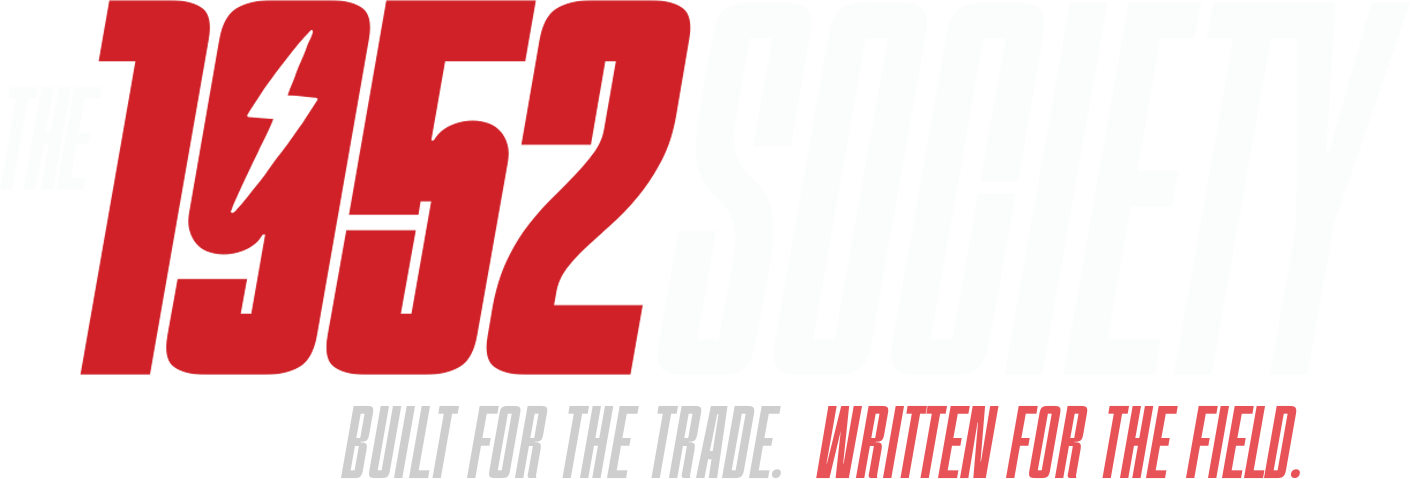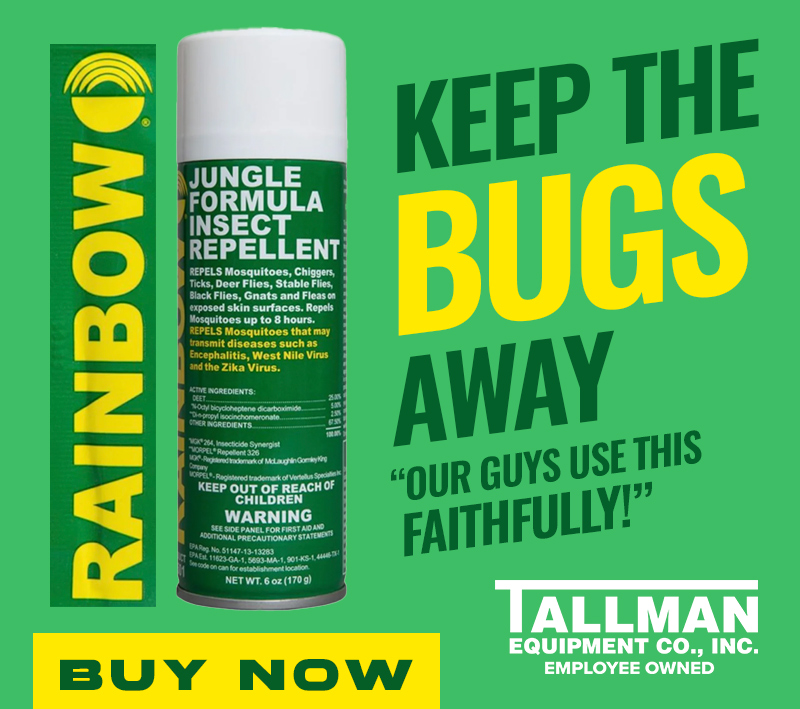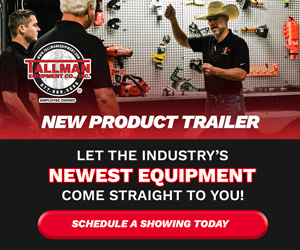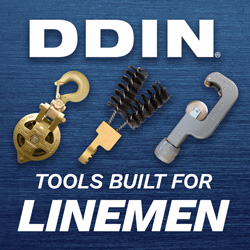It doesn’t hurt to have a little bit of a Gypsy Soul
Born and raised in a small town in British Columbia, Ryan never dreamed of becoming a lineman even though his father owned a small power line company. It wasn’t until a foreman who worked for his father pulled him aside one day after he graduated high school and sold him on the benefits of line work.
So, Ryan put aside his interest in graphic design and started a career that has spanned 20 years. From the first time he climbed a pole to hanging from a helicopter to work on energized lines as a barehand lineman, he’s loved his job. It has also taken him across North America, from the blazing heat of Texas to the sub-zero winters of Canada.
The proud father of three, Ryan lives in Kelowna, British Columbia, with his girlfriend and 12-week-old puppy. He produces his Powerline Podcast there and commutes to Quanta Energized Services (QES) in La Grange, Texas at the Lazy Q Ranch, where he’s an instructor.
We were lucky enough to get some time out of his busy schedule for an interview. Our conversation has been edited for clarity.
Why did you decide to become a lineman? What was the spark?
Honestly, I never had a spark to become a lineman until I tried it. My father owned a small power line company in central British Columbia and was a lineman. He and my mother would often put up the linemen in our house because good places to stay could be hard to come by back in those days. My mom would cook meals and make lunches and give them a place to sleep. So I grew up around line work.
I would do odds and ends, like clean up the bucket trucks, wash them, and stock equipment and tools, but it wasn’t something I thought of doing as a career. After I graduated high school, one of the foremen I’d known for a few years pulled me aside one day and was like, “What are you thinking? You got a primo opportunity here.” I wanted to go into graphic design. He’s like, “Well, why don’t you try this? You’ll top out when you’re 24, and you’ll have a trade ticket, and you can do whatever you want after that.”
It hit me, and I thought about it that night. I came back literally the next day and said to my dad, “I want to try this. Will you give me a shot?” He said, “Yeah.” And that’s where it started. The first time I threw a set of hooks on and went up a pole and got to work with the crews outside, I was hooked. It was just a fantastic job.
What advice would you give to someone considering entering the field?
First off, do a real gut check and make sure this lifestyle is a lifestyle you want to lead. If you come into this trade thinking that you’re going to change it, you’re mistaken. You need to change for the trade. What I mean by that is you work unpredictable hours. You don’t get a choice on whether you’ll work during a storm or get called up in the middle of the night. Do your research on the lifestyle that a lineman lives because it’s a unique one.
Also, you’ve got to be good with heights, being outdoors in all weather conditions, and working with your hands.
Is there a difference with some of the newer people entering the field these days?
I think there is a difference. The advancements in social media and the ability for people to see that this career exists are great. It’s opening people’s lives to this career, but it’s also not showing the reality of what it is.
People see the highlights, flying in helicopters, landing on top of towers, and doing exciting stuff. But it doesn’t show you the hours that you will spend away from your family. Nobody is talking about missing your kids’ sporting events. That’s not reflected in social media. So it’s bringing in this different sort of character.
Back when my father was looking for people to recruit, he would generally talk to ranching or farming kids. Blue-collar people who knew how to work, get up in the middle of the night, drive trucks, and work with their hands.
Talking about the realities of being a lineman, why did you change careers after 15 years?
When one of my kids was in first grade, we recognized he had severe dyslexia. There wasn’t much opportunity to get him the help he needed because we lived in a small town in British Columbia. So we moved to Vancouver, which is a bigger city with a school that could help him. I also decided that I wanted to be a little bit more at home for him. So I moved into a resource management role within the same company I worked for as a lineman. I did that for about five years.
Why and when did you start the podcast?
Growing up with linemen always around, they would sit at the table and tell cool stories about the places they’d been, stuff they’d done, and people they’d met. It was fun to listen to them. But I didn’t relate to those stories until I actually became a lineman and started accumulating my own.
And it is a very unique job. If you want to, you can do some really cool work, meet great people, and explore the world. There aren’t many publications out there that share our stories. There are a few popular books, like Slim or The American Lineman, but I wanted to hear more.
I’ve been an avid consumer of podcasts ever since they’ve existed, audiobooks as well. So I thought, “What a cool, modern way to tell stories. Let’s try to do that through podcasting.” I talked about it for a year. Some of my friends said I was crazy and nobody would listen to a podcast about line work. I just decided to go for it in March of 2019, and it’s been a relative success.
There seems to be a recurring theme in your podcasts about adventure and life on the road. Is this part of who you are or part of the job? Can apprentices expect it if that’s what they’re looking for?
I think to be able to perform this job, you have to be a little bit adventurous to do the sorts of things that we do. We work at heights and with electricity and all these different things that might look dangerous or crazy to any normal person.
You also need a little bit of a gypsy soul. We show up at different locations every day and do new things every day. Even for the guys working for a utility in the same area their whole lives, each day is different.
What kind of qualities make a good successful lineman?
Like I was saying, be on the adventurous side. Also, enjoy working with your hands. A love for the outdoors is important, too. Whether you’re a hunter, fisherman, hiker, whatever, you should like to get out of the house and be outside. Another quality that wouldn’t hurt is an interest in technology and some computer skills considering that the world and businesses are going digital.
In your podcasts, there is a recurring theme about this idea of being a true tradesman and representing the industry the right way. What does that mean?
It means so many things. Let’s take the safety side of it first. The way that you represent yourself while performing your job and being a true tradesman, in my mind, means looking after yourself and the people you work with. If you do that, others will see that and follow, especially if you’re posting on social media or very active in your community.
If you’re doing things wrong, and you know you’re doing them wrong, because you think you can cheat the system or you’re better than others, you’re not acting as a true tradesman, I believe. It will only lead to bad things either for yourself or for somebody else who sees you doing that and looks up to you. It’s potentially going to hurt them as well.
Another aspect of being a true tradesman is how you handle the details in your job. Like, say, a craftsman who used to build swords or something would take the time to meticulously craft that weapon. It seems silly to say, but I think you can and should do the same thing with every powerline or pole or whatever you build. Make it look like a craftsman built it.
Your guests and topics cover a wide gamut, from women in the industry to social media, health, and wellness, and more. How do you choose your topics and find your guests?
As the podcast started to grow, I wanted to branch out from talking to line workers and bring on guests from other subject areas, like health and wellness or finance. I think it’s beneficial for linemen to hear a subject that relates to them, even though it might not be about line work.
I always viewed the Powerline podcasts almost like a TV channel. We have podcasts, but we also have regular episodes, like The American Lineman (Ryan and guest Brady Hansen regularly read a chapter from “The American Lineman,” by Alan Drew) and Linewife (conversations with the wives of linemen and what life is like, hosted by Shanna Sage from Linewife.com). As a podcaster and lineman, I want to give back and help people in the industry.
Are there any episodes that stand out in your mind, where you’re like, “This is a great episode. Anyone reading this interview should go listen to it right now”?
I’ve done a few episodes with lineman Ben Holmes. We dive into topics around what we’re seeing in social media, how we’re representing the trade, and how to be a craftsman and a tradesman. Ben gives it straight up. He’s a well-spoken guy with a lot of great advice.
On the technical side of things, I’ve recorded a few episodes with David Fossa and one that every line worker should listen to is episode 70 on grounding and bonding. Grounding and bonding is one of the most controversial topics in our industry and one that kills the most linemen. This episode will really get you thinking differently and definitely asking more questions.
Another amazing episode, for me, was my conversation with J.P. Dinnell, a former Navy SEAL and sniper who fought in Ramadi and Iraq with Chris Kyle, the American Sniper. His story was cool, and he brought a lot to the table about leadership. He works with Jocko Willink’s group, Echelon Front.
You’ve also helped a podcast called The CallOut get up and running on Powerline, right? What’s that about?
Krisanthe Vlachos had an idea for a podcast called The CallOut for female line workers. But she’s got a business (Krisanthe is the founder of Lineman+Us, a website dedicated to encouraging females to join the front lines as power linewomen) and a few other things going on. So, I said, “Let’s kick it off and get it going on Powerline and see what we can do.”
The idea was to help her get off the ground. I think what’s going to happen now is she’ll take that on herself and start doing the interviews. So I’m not sure if I’m going to do any more episodes under Powerline or if she will start running with it on her own. I’m sure I’ll be a part of it for a while, but I want to continue talking to female line workers and get their perspectives on the trade.
You also have a company called Electric Life. What’s that about?
We sell merchandise and offer a resume program with templates for line workers. I spent five years in resource management and read thousands of resumes. Some union linemen might say, “Oh, we don’t need a resume. We just show up at the hall.” But you need a resume even if you’re starting out or going for any supervisory position. Sometimes companies now ask for your resume so that they can see your experience and add your information on their bid processes.
What gets you up in the morning? What fuels you and makes you take on the day?
First and foremost my kids motivate me to get up and work hard every day. Providing for them is a difficult thing as a father and especially working in this trade. This industry has removed me from being in their life on a daily basis so I do my best to make sure I lead a good example and provide for them in the best way I can.
What else fuels me these days is trying to source out more hobbies in my life. Linework has been such a massive part of my life for the last 20 years, but I’m looking for some other things to do. I love the outdoors, so I’ve started to take an interest in things like archery, hunting, and anything outdoors. That’s what gets me up.
So, what’s in your future? Anything in your professional, personal, or podcast life that you would like us to know about?
This industry has fed two generations of my family. It’s been an amazing career and led to a fantastic lifestyle. In the last 20 years, I’ve had the opportunity to check off most of the things on my linework bucket list, and I’m really enjoying giving back now. Over the last year, I’ve been instructing and coaching at the Quanta Services Lazy Q Line School, as well as continuing to grow Powerline Podcast. I’m going to stay on this path of growing my skills as an instructor and expanding the podcast’s reach for as long as my gypsy soul lets me.
….
For more from Ryan Lucas:
Electric Life Store (electriclifeshop.com)
….
For the best tools for linemen, trust Tallman.








0 Comments